How To Appoint a Commissar (Part 8) - Columbia President Minouche Shafik
Minouche Shafik is a carbon copypasta of Claudine Gay and has destroyed another Demoralized DIEvy League institution - UNC frat white pill at the end
Comrades: Minouche Shafik is the final boss of the naked emperor globalists.
In 2023, Baroness Shafik was appointed the first female President of Columbia University. Like Claudine Gay, her freshman year has been a dumpster fire. At the time of her coronation, a record 6 of the 8 Demoralized DIEvy League presidents were women. Since then, 2 of the 6 have resigned (Gay and UPenn’s Liz Magill) and the other 4 are copypasta clones of each other. They are empty vessels helming sinking ships and hollow institutions.
How it started:
How it’s going - the mascot lion would have made a better president than her:
Like NPR CEO Katherine Maher and other commissars, Shafik’s resume is full of demoralized institutions and elite circle jerks: Oxford, Georgetown, Wharton, World Bank, IMF, Bank of England, LSE. Her handling of the campus intifada is the worst of any college president and should be documented as Harvard Business School case study of How To Fail at Crisis Leadership. She was nowhere to be found throughout the turmoil, hiding behind phalanxes of lawyers and PR experts to issue weak statements that only worsened the situation. Somehow she has pissed off every constituency. All you have to do is babysit the students while stroking the egos of the donors and professors, yet she failed on every front while getting paid $1 million and raking in $1 billion in federal funding per year. As her recent rehearsed statement shows, she possesses the commissar gift of spewing many words that mean nothing. Time to season her propaganda announcement with Yuri special spice.
Nemat “Minouche” Shafik, a leading economist whose career has focused on public policy and academia, will become the 20th president of Columbia University on July 1, 2023. Her election concludes a wide-ranging and intensive search launched after Lee C. Bollinger announced that he would step down as Columbia’s president at the end of the 2022-2023 academic year.
In a letter to the community, Jonathan Lavine, chair of the Columbia Board of Trustees, called Shafik “the perfect candidate: a brilliant and able global leader, a community builder, and a preeminent economist who understands the academy and the world beyond it. What set Minouche apart as a candidate is her unshakable confidence in the vital role institutions of higher education can and must play in solving the world’s most complex problems. Like all of us in the Columbia community, she believes that in order to bring about meaningful change, we have a collective obligation to combine our distinctive intellectual capacities with groups and organizations beyond the academy.”
Jonathan Lavine has a BA from Columbia, MBA from Harvard, and billions from 30 years of Private Equity corporate raiding at Bain Capital. His idiotic words are priceless. Like common sense there are some things money can’t buy - for everything else, there’s elite virtue signaling cards. He also donates to WBUR, Boston's NPR affiliate; the Equal Justice Initiative, an organization dedicated to ending mass incarceration and excessive punishment; the Anti-Defamation League (ADL), Combined Jewish Philanthropies of Boston; and the United States Holocaust Memorial Museum Council. The “collective” left always eats its own and in this case globbled up big chunks of his cash. Has he learned his lesson not to feed the crocodiles?
Lisa Carnoy, who led the Presidential Search Committee and whose term as co-chair of the Board of Trustees ended in the fall, described an extensive process for the 15 members of the Presidential Search Committee. The group spent hundreds of hours consulting with “advisory committees and academic leaders inside and outside of Columbia, talking with potential candidates, hearing from friends of the University and in many days of formal interviews and deliberations,” Carnoy wrote in a thank-you letter to search participants. “By working together across the University and with our many stakeholders, we conducted a search not on behalf of any single group, but one that was in the overall interests of Columbia and with the very best result,” said Carnoy. “Minouche Shafik is the right leader for Columbia’s next chapter.”
Nauseating pats on the back for a terrible decision. By crediting many stakeholders, Carnoy has diffused responsibility so one will be held accountable. Like Harvard, the current Columbia Board of Trustees is stacked with Democrat megadonors, several Obamassars like Obama’s DHS Chief Jeh Johnson, and a Pritzker. A fish rots from the head down.
President Lee C. Bollinger said of his successor, “I feel like, if I had looked all over the world for the best person to next lead Columbia, I would have chosen Minouche Shafik. Her expertise, her experiences—both personal and professional—and her general outlook on academic and public life make her an inspired appointment. I offer her my warmest congratulations and very best wishes as she takes on what I believe to be the best job in the world.”
Intersectionality rule: if your successor is more diverse than you, you must bootlick extra hard. Columbia alums and NYC Politburo members Chuck and Jerry know how to play this game. It’s the raison d’etre of the Democrat party.
Shafik has led the London School of Economics and Political Science (LSE) since 2017. There, she has overseen vast improvements to the student experience, recruited talented academic leaders, and managed significant expansion and infrastructure projects. She is a tireless proponent of diversity and inclusion and a creative and thoughtful leader committed to cultivating and promoting service to the public good. Shafik has edited, co-authored, or authored numerous articles and books, including, most recently, What We Owe Each Other: A New Social Contract (2021, Princeton University Press), in which she calls for a better social contract to underpin our economic system and challenges institutions and individuals to rethink how we can better support each other to thrive.
Only took a few paragraphs to simp for DIE and the “better social contract” of Socialism. The student-to-permanent staff ratio at LSE decreased during Shafik’s reign, resulting in the worst student-to-permanent staff ratio among comparable universities in the UK. Her academic record is spotty at best. If globalist Christine Lagarde and fake doctor Tedros are pumping you, you are probably as full of BS as they are.
The selection of Shafik marks the first time since Columbia’s founding that the University will be led by a woman. Shafik also served as the first female leader of LSE and previously was the first female permanent secretary of the U.K. Department for International Development. Nobel laureate and Columbia economics professor Joseph Stiglitz has known Shafik since the 1990s, when they were colleagues at the World Bank. He described her as a great economist, a great researcher, and a great listener. In each job she’s held, “she has combined enormous intellect with interpersonal skills that were very impressive, navigating complex bureaucracies.” These bureaucracies, Stiglitz said, consist of very intelligent people and require “dealing with them with respect, listening to them, and crafting solutions to the problems that they confront in a creative way.” She has done this while keeping up “her commitment to intellectual inquiry.” Stiglitz continued, “at LSE, all the people I know there—and I have a lot of friends who teach there—all of them have enormous admiration for her.”
Do bureaucrats do anything besides pat each other on the back all day? They are not equipped to deal with any real issues like how to discipline the overgrown children taking over their campuses. Stiglitz is a classic intellectual yet idiot:
Shafik was born in Alexandria, Egypt. When she was 4 years old, her family fled the country during President Gamal Abdel Nasser’s nationalization program. Her father, a scientist, found work in the United States, where he had done his PhD, and Shafik attended numerous schools in Florida, Georgia, and North Carolina. She holds a Bachelor of Arts in economics and politics from the University of Massachusetts-Amherst, where she graduated summa cum laude and Phi Beta Kappa; a Master of Science in economics from the LSE; and a Doctor of Philosophy in economics from St Antony's College, Oxford University. Shafik began her career at the World Bank, becoming the bank’s youngest-ever vice president at the age of 36. She later served as Permanent Secretary of the U.K.’s Department for International Development, where she led an overhaul in British foreign aid; as Deputy Managing Director of the International Monetary Fund during the European debt crisis; and as Deputy Governor of the Bank of England, where she sat on all monetary, financial, and prudential policy committees and was responsible for a balance sheet of more than £500 billion (equivalent to approximately $605 billion).
Ironic that Shafik fled civil unrest, only to bring it to the West. Elite commissar biographies are full of credentials, but bereft of accomplishments. What did she do with the $605 billion balance sheet? Her track record is full of failing up.
In a conversation with Columbia News earlier this month, Shafik talked about higher education, research, diversity, student engagement, and what she is looking forward to once she joins Columbia this summer. For Shafik, teaching and research are synergistic. She believes that teaching at a top-tier university like Columbia “is informed by and imbued with research,” and that students should be thought of as “future scholars who themselves will have to develop the skills of creating knowledge and advancing their own arguments.” The modern university, Shafik said, should foster curiosity-driven research and “protect the space for that creativity, to move the frontiers of human knowledge.” What’s more, according to Shafik, universities should nurture an environment where people don't always agree, but “learn from each other” and “derive mutual understanding from that learning.” This for her is “an essential part of fostering an open society.”
Columbia’s campus environment is now enriched by scholars who are “full of learning from each other and deriving mutual understanding”.
Shafik spoke passionately about how the work of the university should promote social justice and human thriving in a pluralistic society. She said that universities have a particular role in “giving young people opportunities to encounter difference and to learn to engage with difference.” In the complex world we live in, Shafik said that “being able to engage with people who have a very different perspective and point of view is an essential way to build a cohesive society.” This engagement, she continued, allows people “to live together and thrive together and make decisions together.” She spoke about how diverse leadership can bring different perspectives and outcomes. “Everywhere I’ve worked, I’ve made a huge effort to make sure that I had teams around me who had different points of view, different backgrounds, and different life experiences.” She described her leadership style as “inclusive and open.” The best thing a leader can do, she said, is recruit “smart, talented people” and create “an environment in which they can thrive.”
How’s that social justice, human thriving, and diverse leadership going for ya Baroness?
Shafik believes that diversity can be encouraged by opening “the door for others,” which results in “better workplaces, better decisions, and more impact.” To this end, she sees universities playing an important role “in social mobility and providing access and opportunity to everyone. There is much debate about this issue in terms of admissions, in terms of the costs of education, in terms of the impact and benefits of higher education. And we need to rise to that challenge because providing opportunities for everyone is a core part of what we do.” Shafik is committed to Columbia’s Core Curriculum, which she sees as providing the “foundation for citizenship” and cultivating in people the “capacity to think for themselves.” She is looking forward to engaging with students, whom she said are “important partners in thinking about how to improve the student experience, what their education should encompass, as well as participating in the research and the intellectual life of the University.”
Copypasta word salad all the way down. The doors are now closed at Columbia because students no longer feel safe attending class. This is what happens when you get rid of standardized testing and meritocracy.
On a personal note, Shafik is excited to move to New York City. “When I met my husband, he was living in New York City. Three of our children are New Yorkers. So, my family feels we are coming back to the center of the universe. I have a lot of curiosity and eagerness to discover the city.” Columbia, she continued, “is a great University in a great, global city. And that combination is quite distinctive, and I think creates an openness to the world and a sense of dynamism and creativity that is unique.” Over the next few days, before heading back to LSE to conclude her service, Shafik will be visiting all four Columbia campuses, talking with faculty, students, staff, and local community leaders. “I do a lot of management by walking around…meeting people, chatting, learning about what they’re doing and I look forward to doing lots of that at Columbia.”
This toxic algae pond is cleaner than NYC and Columbia’s campus.
More from her official biography and a Gates cameo:
Throughout her career, Shafik has been at the center of efforts—often during pivotal, high-stakes moments—to address some of the world’s most complex and disruptive challenges. At the World Bank, she worked on the institution’s first-ever report on the environment and later advised governments in Eastern Europe after the fall of the Berlin Wall. At the height of the “Make Poverty History” campaign, Shafik helped secure the UK’s commitment to giving 0.7% of GDP in aid and focused it on fighting poverty in the poorest countries in the world. She worked on both the European debt crisis and the Arab Spring while she was at the IMF. At the Bank of England, she led work on fighting misconduct in financial markets and was responsible for the contingency planning around the Brexit referendum. At LSE, she has encouraged academic work on how to rethink the social contract for the modern economy. “I have had jobs that are about doing good, such as fighting poverty or leading educational institutions as well as jobs that are about preventing bad things from happening, like at the IMF and Bank of England,” Shafik has said of her career. “Both are vital if we are to make and secure progress for humanity.”
Shafik has authored, edited, and co-authored a number of books and articles. In her writings and speeches, she has been clear eyed in how leading global institutions must transcend technocratic expertise to engage more fully with the people they serve. She has called for a better social contract to underpin our economic system, most notably in her recent book, What We Owe Each Other: A New Social Contract (2021, Princeton University Press), in which she challenges institutions and individuals to rethink how we can better support each other to thrive. In addition, she has written articles for a number of publications, including Oxford Economic Papers, Columbia Journal of World Business, The Middle East Journal, Journal of African Finance and Economic Development, World Development, and the Journal of Development Economics. Shafik serves or has previously served on numerous boards including as Deputy Chair of the Trustees of the British Museum, board member of the Supervisory Board of Siemens, the Bill and Melinda Gates Foundation the Council of the Institute for Fiscal Studies, and BRAC. In recognition of her public service, she was made a Dame Commander by Queen Elizabeth II in 2015 and a cross-bench peer in the House of Lords in 2020. She is also an Honorary Fellow of the British Academy, St Antony’s College at Oxford University, and a Fellow of the Academy of Social Sciences. She was awarded Honorary Doctorates from the University of Warwick, the University of Reading, the University of Glasgow, and the American University in Beirut, and was selected “Woman of the Year” at the Global Leadership and Global Diversity awards in 2009. She also was named Forbes “100 Most Powerful Women” in 2015.
Congratulations to Baroness Shafik for destroying Columbia! My 2023 Demoralized DIEvy League March Madness Bracket was on the money:
How To Get Into Harvard (Part 3) - DIEvy League Demoralization March Madness
Comrades: Welcome to Demoralization March Madness! Just as RISD became RISDIE, the Ivy League has become the DIEvy League. Part 1 of How To Get into Harvard established the initial rankings and methodology, while Part 2 provided a fall semester update
Which way, Zoomers?






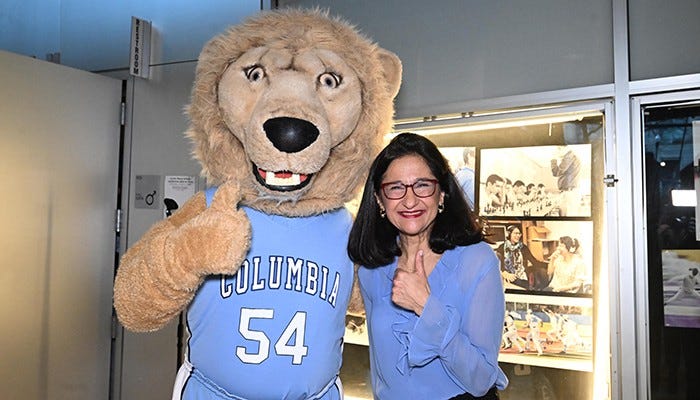







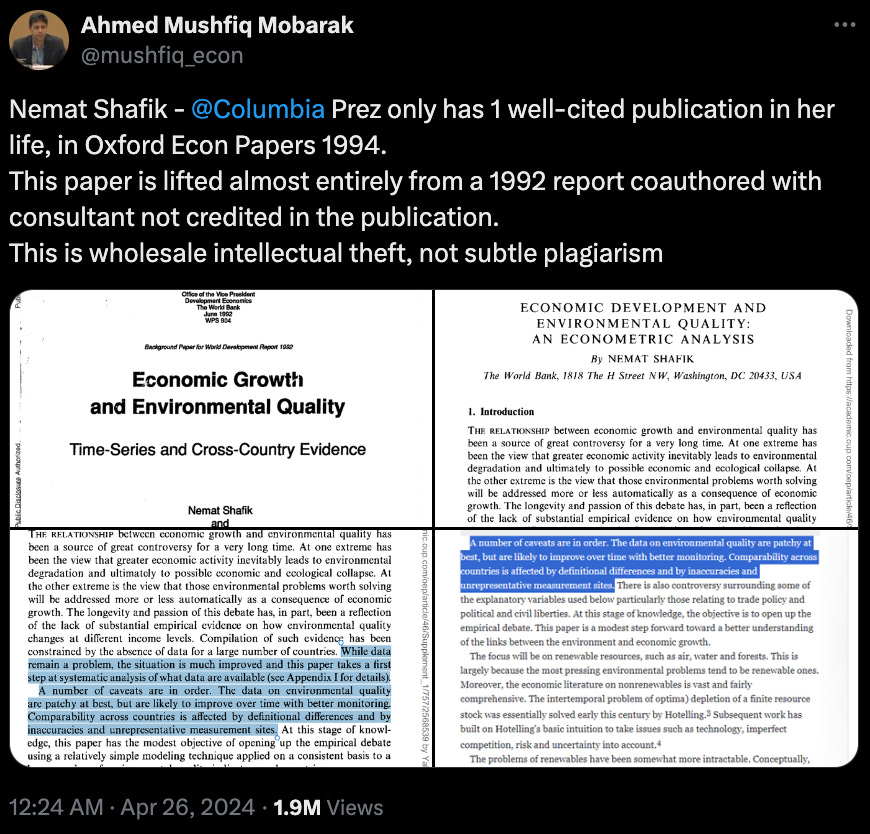

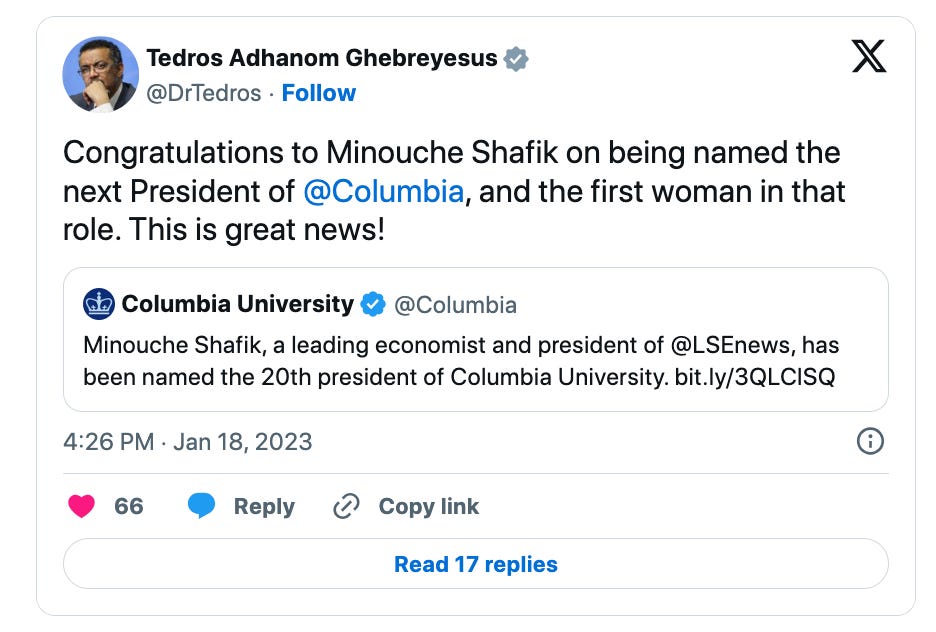

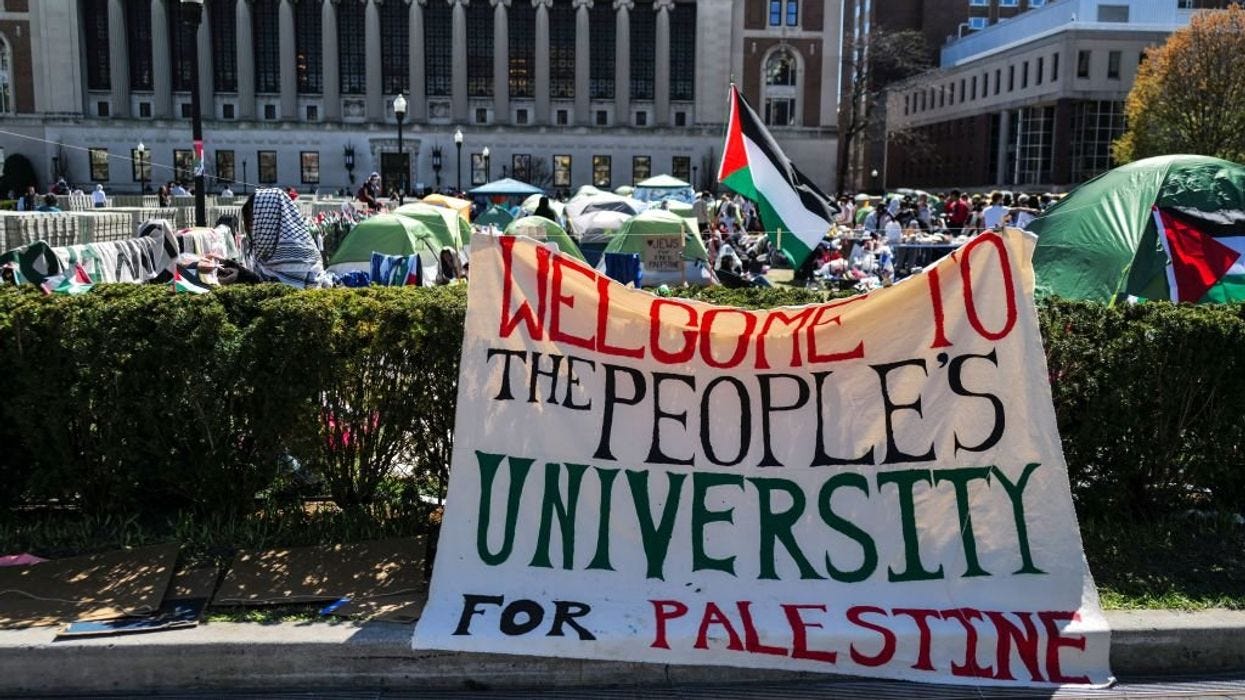


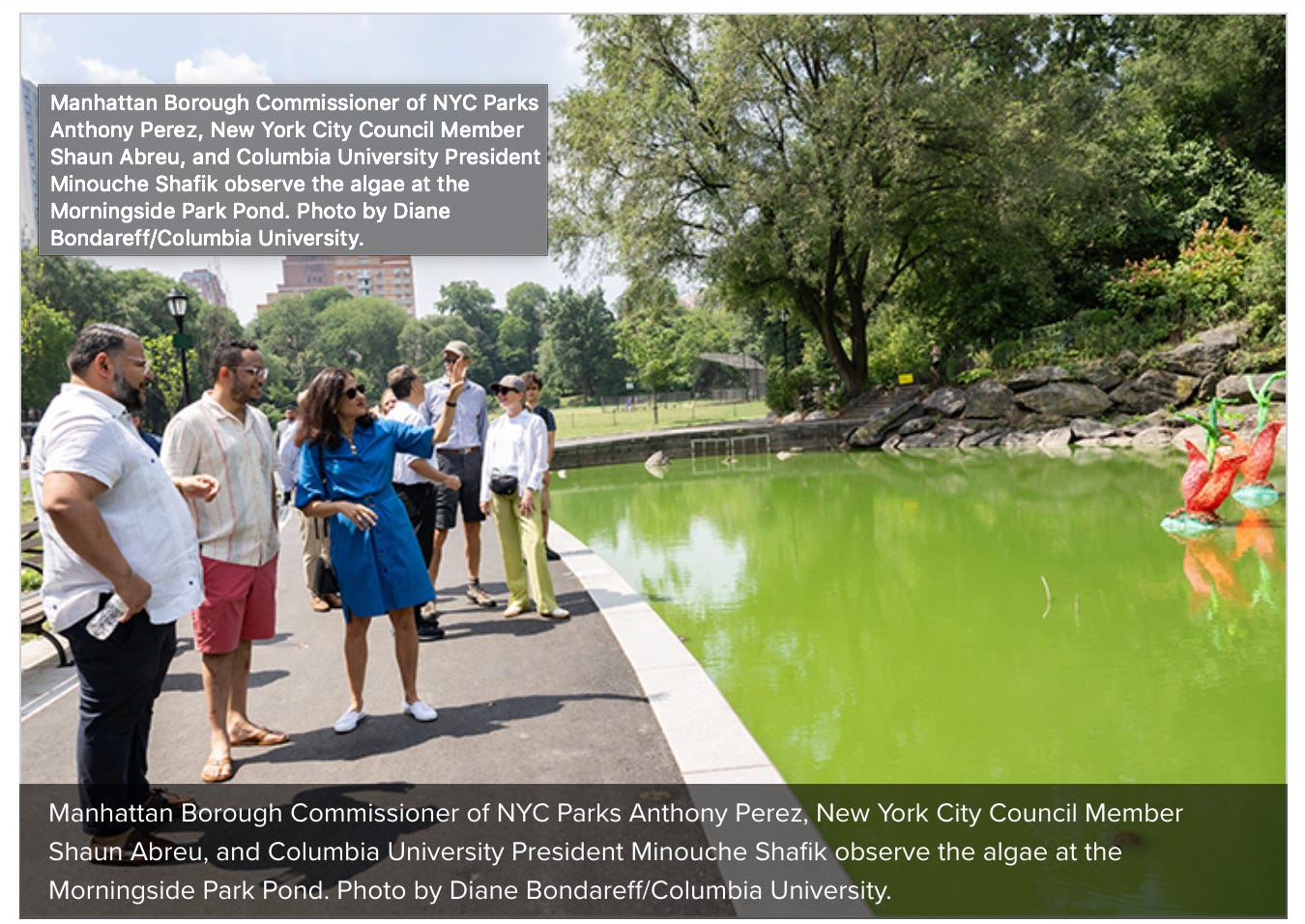




I started creating my own personal concept for this after speaking with another physician in the Summer of 2022 as we reflected upon the leadership disasters of Spring 2020. We were both practicing in the inpatient setting in NYC during that.
I call it faux leadership. It's that group of people that look like leaders in a credential way, speech, or in manner of dress who are chronically on the lists of search committees. Because true emergencies are rare these people compete on looking like leaders rather than acting like a leader.
Some symptoms of the condition that manifest in the medical field:
- long emails explaining the 'unprecedented' situation and asking for our understanding and patience. The email cannot communicate any important ideas.
- when protocols do change, describe how this is no change at all but rather a continuation of the perfect plan that was ordained at the beginning.
- punish anyone in the ranks below who questions the approach or merely leads by doing reasonable things.
- praise people who have done clearly counter productive or directly harmful things because their intentions were pure(ly in line with the faux leadership talking points).
- create and/or approve policies and procedures that are performative and could sound good to some (daily check ins to say you don't have COVID symptoms) but do nothing to protect workers or patients.
- unilaterally ration care and surgery to seriously ill patients without allowing individual physicians to decide if they want to take on the risk of caring for ill patients, to whom we have supposedly have dedicated our lives to.
- fail to ever make true tradeoffs such as reducing/lightening documentation requirements so fewer physicians can take care of more patients. Instead live in a fantasy world where people just have endless energy to pour into work.
- instead of speaking directly to people causing team strife or performing poorly, send out vague, passive aggressive emails. Bonus points if you impose new, burdensome rules that do not fix the issue and only encumbered the people already rowing together.
- bring in outside consulting groups to have built in fall boys when implemented ideas fail.
- do not make decisions even in critical, time limited situations, instead set up committees with (not really) diverse view points that will come to consensus weeks (if you are so fortunate) after the threat has passed.
- punish people who make reasonable decisions on the frontline in dire circumstances.
She's born in Egypt, a socialist and Muslim - how in the hell does she get dual citizenship in UK and the U.S.? Answer: She did it through marriage, and divorce to very rich men, lol. She's post-nationalist, post-American, post-classical liberalism - which is exactly who our elite want running things. Of course these riots happen under her. It's also important to note that Columbia has been nurturing radical Muslims and Jihad for 50 years. Eduard Said's "Orientalism", a Marxist faux history that ignores 1400 years of Islamic imperial conquest, enslavement (sexual and otherwise), slaughter and destruction, was created at Columbia. Obama was a favored student of Said and Obama is also befriended Rashid Khalidi who continued Said's nonsense and vicious ideological work. The entire point is to position the West as the apex predator/oppressor, as though Islam was a lil lamb that the Western wolf set upon.
The rot began long ago. It took 100 years to get here. Wake up.